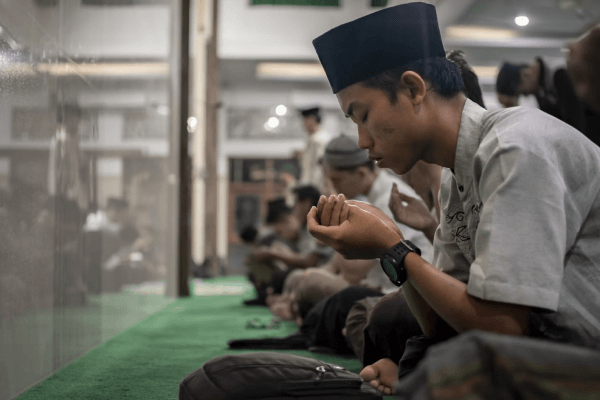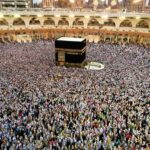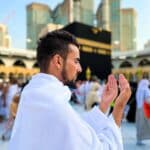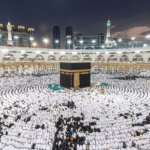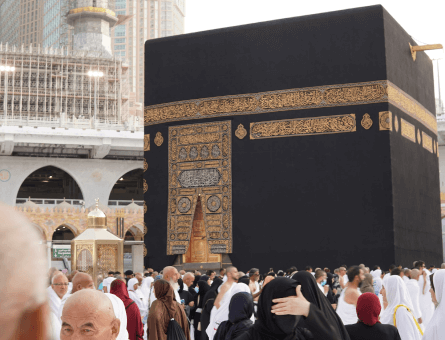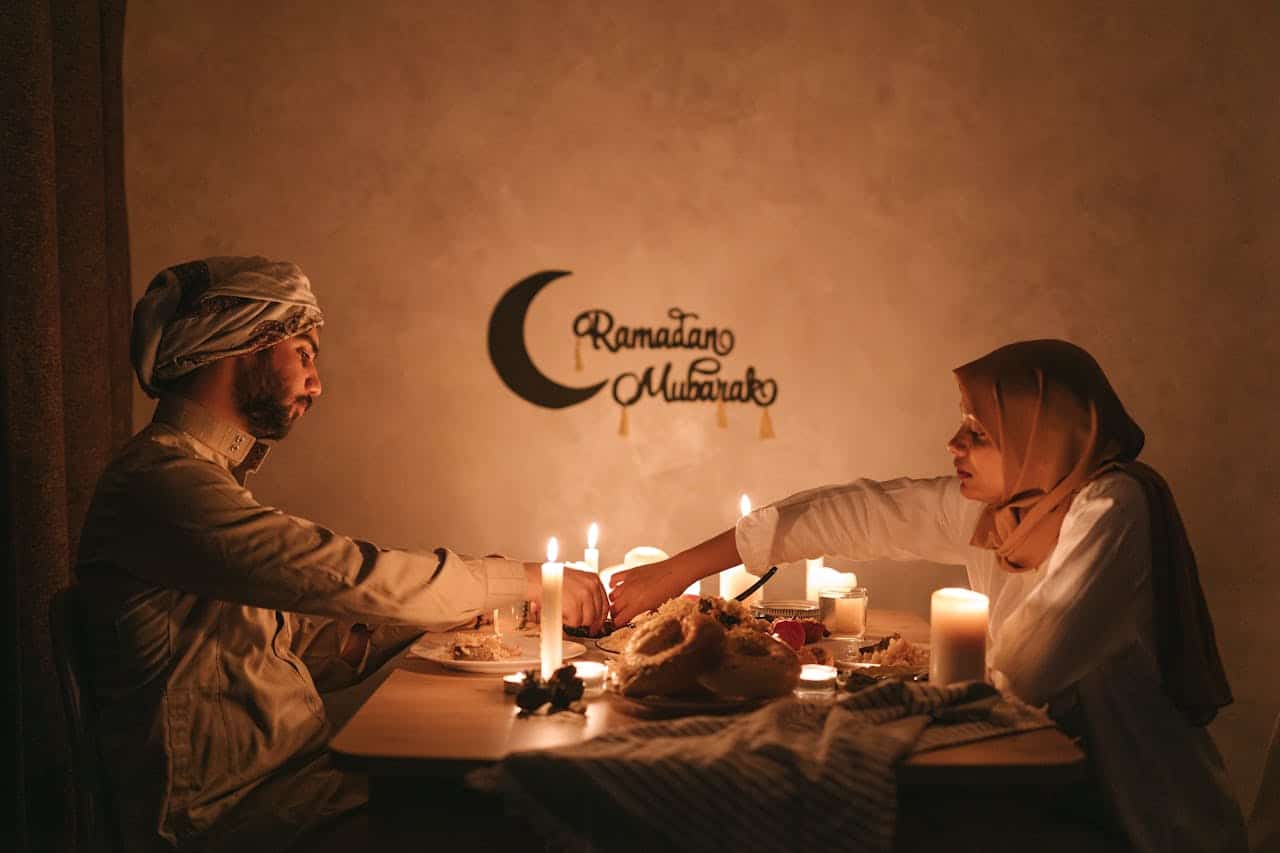Ramadan Duas To Read in 2024 – Arabic and English Translations
Ramadan is the third pillar of Islam and the holy month in which Muslims give up a big portion of their worldly pleasures to revert to the true purpose of their life, i.e. worshipping Allah SWT. It is known as the month of fasting, generosity, devotion, reflection, patience and sacrifice observed by Muslims around the globe.
During the sacred month of fasting, Muslims do not only abstain from drinking and eating from dawn to dust. They also guard themselves from committing other sins and wrongs such as lying or cheating and instead indulge in religious activities like memorising duas, praying and reciting the Holy Quran.
With that being said, here is a list of all the significant Ramadan duas that Muslims must recite during the blessed month.
What Is Ramadan?
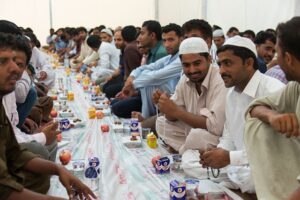
Ramadan is the third pillar of Islam and the ninth month in the Hijri calendar (Muslim lunar calendar). Allah SWT has instructed Muslims to fast – abstain from drinking and eating from sunrise till sunset – during the 29 or 30 days of this month.
According to Islamic history, Muslims believe that it was one of the last ten days of Ramadan when Allah SWT revealed the Holy Quran to Prophet Muhammad (PBUH) in 610 AD. This sacred night is also known as “Laylatul Qadr,” or the “Night of Power.”
“The month of Ramadan in which was revealed the Quran, a guidance for mankind and clear proofs for the guidance and the criterion (between right and wrong). So whoever of you sights (the crescent on the first night of) the month (of Ramadan i.e. is present at his home), he must observe Sawm (fasts) that month.” (Holy Quran, 2:185)
Why Do Muslims Fast During Ramadan?
The religion of Islam is based on five pillars, fasting being one of them. The act of observing a fast for the sake of Allah SWT allows Muslims to devote themselves to the teachings of Islam and learn to be paitent. Refraining from eating and drinking doesn’t only help nourish your body but it also helps cleanse your mind and soul.
Allah SWT in the Holy Quran says, “O you who believe, fasting is prescribed for you as it was prescribed for those before you that you may become righteous.” [Holy Quran, 2:183]
Abu Umamah (RA) reported,
I said: O Messenger of Allah, ‘Which deed is best?.’ He (PBUH) said: ‘Take to fasting, for there is nothing equal to it.’(An-Nasai: 2224)
“Whoever fasts Ramadan out of faith and with the hope of (Allah’s) reward, all his previous sins will be forgiven.” (Sahih Al Bukhari, 3277)
Prophet Muhammad (PBUH) said, “There are three whose supplication is not rejected: The fasting person when he breaks his fast, the just leader, and the supplication of the oppressed person; Allah raises it up above the clouds and opens the gates of heaven to it. And the Lord says: ‘By My might, I shall surely aid you, even if it should be after a while.’” (Tirmidhi)
What Is the Importance of Ramadan?
The ultimate aim of fasting is to help a Muslim purify their soul, strenghten their faith and to attain Allah SWT’s pleasure by following the Sunnah of Prophet Muhammad (PBUH). The holy month provides Muslims with a great opportunity to connect with Allah SWT spiritually, mend their way of life and protect themselves from Hellfire on the Day of Judgement.
Abu Hurairah (RA) reported that the Messenger (PBUH) of Allah SWT said,
إِذَا دَخَلَ شَهْرُ رَمَضَانَ فُتِّحَتْ أَبْوَابُ السَّمَاءِ وَغُلِّقَتْ أَبْوَابُ جَهَنَّمَ وَسُلْسِلَتِ الشَّيَاطِين
“When the month of Ramadan enters, the gates of Heaven are opened, and the gates of Hell are closed and the devils are chained.”(Sahih Al-Bukhari & Muslim)”
Sahl Ibn Saad (RA) narrated that Prophet Muhammad (PBUH) said, “There is a gate in Paradise called Ar-Raiyan, and those who observe fasts will enter through it on the Day of Resurrection and none except them will enter through it.
It will be said, ‘Where are those who used to observe fasts?’ They will get up, and none except them will enter through it. After their entry the gate will be closed and nobody will enter through it.” (Sahih Bukhari: 1896)
Uthman ibn Abu Al-Aas narrated, “The Messenger of Allah (PBUH) said: ‘Fasting is a shield from the Hellfire just like the shield of any of you in battle.’” (Sunan Ibn Majah, 1639)
Ramadan Dua Day 1
اَللّـهُمَّ اجْعَلْ صِيامي فيهِ صِيامَ الصّائِمينَ، وَقِيامي فيهِ قيامَ الْقائِمينَ، وَنَبِّهْني فيهِ عَنْ نَوْمَةِ الْغافِلينَ، وَهَبْ لى جُرْمي فيهِ يا اِلـهَ الْعالَمينَ، وَاعْفُ عَنّي يا عافِياً عَنْ الْمجْرِمينَ
Transliteration: Allahumaj al siyami fihi siyamasaa imina wa kiyami fihi kiyamal kaa imina wa nabhini fihi an naumatil gafilina wahabli jurmi fihi ya ilahal almina wafu anni ya afian anil mujrimin
Translation:
“O Allah on this day make my fasts the fasts of those who fast sincerely and my standing up in prayer of those who stand up in prayer. Awaken me from the sleep of the heedless and forgive me my sins. O God of the worlds forgive me, O one who forgives the sinners.”
Ramadan Dua Day 2
اَللّـهُمَّ قَرِّبْني فيهِ اِلى مَرْضاتِكَ، وَجَنِّبْني فيهِ مِنْ سَخَطِكَ وَنَقِماتِكَ، وَوَفِّقْني فيهِ لِقِرآءَةِ آياتك بِرَحْمَتِكَ يا اَرْحَمَ الرّاحِمينَ
Transliteration: Allahuma karibni fihi ila mardatika wajanibni fihi min sakhatikawa nakima tika wa wafikni fihi likiraa ati ayatikabi rehmatika ya arhamar rahimin
Translation:
Allah on this day take me closer towards your pleasure, keep me away from your anger and punishment, grant me the opportunity to recite your verses by your mercy, O the most merciful.
Ramadan Dua Day 3
اَللّـهُمَّ ارْزُقْني فيهِ الذِّهْنَ وَالتَّنْبيهَ ، وَباعِدْني فيهِ مِنَ السَّفاهَةِ وَالَّتمْويهِ ، وَاجْعَلْ لى نَصيباً مِنْ كُلِّ خَيْر تُنْزِلُ فيهِ، بِجُودِكَ يا أجود الاْجْوَدينَ
Transliteration: Allahumar zukani fihizzih nawat tabiha wabaidnifihi minsafahati watawihi wajaali nafsiban minkuli khairin tunzilu fihi bijudka ya ajwadal ajwadina
Translation:
“Allah on this day grant me wisdom and awareness; keep me away from foolishness and pretension, grant me a share in every blessing you send down, by your generosity, or the most generous.”
Dua for Opening Your Fast (At Suhoor)
وَبِصَوْمِ غَدٍ نَّوَيْتُ مِنْ شَهْرِ رَمَضَانَ
Transliteration: Wa bisawmi ghadinn nawaiytu min shahri ramadan.
Translation: “I intend to keep the fast for tomorrow in the month of Ramadan.”
Dua for Breaking Your Fast
اَللّٰهُمَّ اِنِّيْ لَكَ صُمْتُ وَبِكَ اٰمَنْتُ وَعَلَيْكَ تَوَكَّلْتُ وَعَلٰي رِزْقِكَ اَفْطَرْتُ
Transliteration: Allahumma inni laka sumtu, wa bika aamantu, [wa ‘alayka tawakkaltu], wa Ala rizqika aftartu.
Translation: “Oh Allah! I fasted for You and I believe in You [and I put my trust in You] and I break my fast with Your sustenance.”
Abu Dawood (RA) reported that another Dua was recited by the Messenger (PBUH) of Allah SWT when breaking his fast. It was as follows:

ذَهَبَ الظَّمأُ، وابْتَلَّتِ العُرُوقُ، وَثَبَتَ الأَجْرُ إِنْ شاءَ اللَّهُ تَعالى
Transliteration: Dhahaba al-zama wa’btalat al-‘uruq wa thabata al-ajr
Translation: “The thirst is gone, the veins are moistened, and the reward has been earned if Allah wills.”
Moreover, Ibn Majah (RA) reported that Prophet Muhammad (PBUH) suggested that Muslims should recite the following dua when opening their fast with a group of people:
أفطر عندكم الصائمون ، وأكل طعامكم الأبرار ، وصلت عليكم الملائكة
Transliteration: aftara indakum as-saa’imoon, wa akala ta’aamakum al-abraar, wa sallat alaikum al-malaa’ikah.
Translation: “May the fasting people break fast at your place, and may the pious eat from your food, and may the angels pray for you.”
Dua for Laylatil Qadr
The wife of Prophet Muhammad (PBUH), Aisha (RA) said, “I asked the Messenger (PBUH) of Allah SWT: ‘O Messenger (PBUH) of Allah SWT, if I know what night is the night of Qadr, what should I say during it?’ To this, Prophet Muhammad (PBUH) replied with the following dua:
اَللَّهُمَّ إِنَّكَ عَفْوٌ تٌحِبٌّ العَفْوَ فَأَعْفَوْ عَنِّي
Transliteration: Allahumma innaka `afuwwun tuhibbul `afwa fa`fu `annee’”
Translation: “O Allah, You are the Most Forgiving and You love to Forgive, so forgive me.”

Dua for the Sighting of the Moon
اللَّهمَّ أَهلَّهُ علينَا بالأمنِ والإيمانِ والسَّلامةِ والإسلامِ ربِّي وربُّكَ اللَّهُ
Transliteration: Allahumma ahillahu alayna bil-amni wal-iman was-salaamati wal-islam. Rabbi wa rabbuka Allah.
Translation: “Oh Allah, make it a start full of peace and faith, safety and Islam. My lord and your lord is Allah.”

Dua for Your Parents
رَّبِّ ٱرْحَمْهُمَا كَمَا رَبَّيَانِى صَغِيرًا
Transliteration: Rabbir hamhuma kama Rabbayani Sagheera.
Translation: My Lord, have mercy upon them (parents) as they brought me up [when i was] small.
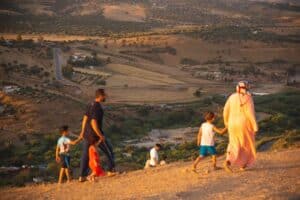
رَّبِّ ٱغْفِرْ لِى وَلِوَٰلِدَىَّ وَلِمَن دَخَلَ بَيْتِىَ مُؤْمِنًۭا وَلِلْمُؤْمِنِينَ وَٱلْمُؤْمِنَـٰتِ وَلَا تَزِدِ ٱلظَّـٰلِمِينَ إِلَّا تَبَارًۢا
Transliteration: Rabbi ighfir lee waliwalidayyawaliman dakhala baytiya mu/minan walilmu/mineena walmu/minatiwala tazidi aththalimeena illatabaran
Translation: “My Lord, forgive me and my parents and whoever enters my house a believer and the believing men and believing women. And do not increase the wrongdoers except in destruction.”
Dua to Recite After Taraweeh Prayers
بِسمِ اللهِ الرَّحمَنِ الرَّحِيْم. الحَمْدُ لِلَّهِ رَبِّ العَالَمِيْن، وَالصَّلاَةُ وَالسَّلاَمُ عَلَى أَشْرَفِ الأَنْبِيَاءِ وَالمُرْسَلِيْن سَيِّدِنَا وَمَوْلاَنَا مُحَمَّدٍ وَعَلَى آلِهِ وَصَحْبِهِ أَجْمَعِيْن
اَللَّهُمَّ اجْعَلْناَ بِالْإِيْمَانِ كَامِلِيْنْ، وَلِلْفَرَآئِضِ مُؤَدِّيْنَ، وَلِلصَّلَاةِ حَافِظِيْنَ، وَلِلزَّكَاةِ فَاعِلِيْنَ، وَلِمَا عِنْدَكَ طَالِبِيْنَ، وَلِعَفْوِكَ رَاجِيْنَ، وَبِالْهُدَى مُتَمَسِّكِيْن، وَعَنِ اللَّغْوِ مُعْرِضِيْنَ، وَفِي الدُّنْيَا زَاهِدِيْنَ، وَفِي الْأَخِرَةِ رَاغِبِيْنَ، وَبِالْقَضَاءِ رَاضِيْنَ، وَبِالنَّعْمَاءِ شَاكِرِيْنَ، وَعَلَى الْبَلاءِ صَابِرِيْنَ، وَتَحْتَ لِوَاءِ سَيِّدِنَا مُحَمَّدٍ صَلَّى اللهُ عَلَيْهِ وَسَلَّمَ يَوْمَ الْقِيَامَةِ سَائِرِيْنَ، وَإِلَى الْحَوْضِ وَارِدِيْنَ، وَفِي الْجَنَّةِ دَاخِلِيْنَ، وَمِنَ النَّارِ نَاجِيْنَ، وَعَلَى سَرِيْرَةِ الْكَرَامَةِ قَاعِدِيْنَ، وَبِحُوْرِ عيْنٍ مُتَزَوِّجِيْنَ، وَمِنْ سُنْدُسٍ وَاِسْتَبْرَقٍ وَدِيْبَاجٍ مُتَلَبِّسِيْنَ، وَمِنْ طَعَامِ الْجَنَّةِ آكِلِيْنَ، وَمِنْ لَبَنٍ وَعَسَلٍ مُصَفًّى شَارِبِيْنَ، بِأَكْوَابٍ وَأَبَارِيْقَ وَكَأْسٍ مِنْ مَعِيْنٍ، مَعَ الَّذِيْنَ أَنعَمْتَ عَلَيْهِمْ مِنَ النَّبِيِّين والصِّدِّيقِينَ والشُّهَدَاءِ والصَّالِحِين، وحَسُنَ أُولَئِكَ رَفِيقًا، ذَلِكَ الْفَضْلُ مِنَ اللهِ وَكَفَى بِاللهِ عَلِيْمًا، وَالحَمدُ لِلَّهِ رَبِّ العَالَمِينَ
Translation: “In the name of Allah the Most Gracious and Most Merciful. Praise be to the Lord of all the Worlds, prayers and salutations be upon the noblest of all the prophets, our leader (sayyiduna) Muhammad, and upon his entire family and companions.
O Allah make us from those who have complete faith, perform all obligations, guard their prayers, give zakat, seek that which is due from You, hope for Your forgiveness, hold on firmly to guidance, turn away from futile acts, show no interest for worldly pleasures, desire the life of the hereafter, are pleased with the divine decree, are thankful for Your blessings, are patient during trials, would walk under the flag of our leader (sayyidina) Muhammad s.a.w. on the Day of Judgement, would arrive to the Prophet’s well (in the hereafter), would enter the Paradise, would be saved from the hellfire, would sit on the honoured mattresses (of paradise), would be married to the companions of Paradise, would be adorned with garments (of paradise) from Silk and Brocade, would eat from the food of Paradise, would drink from the milk and pure honey in the cups and goblets from the fountain of clear-water, in the company of those You bestow blessings upon them from amongst the Prophets, the righteous, the martyrs and the pious and what a great company do they make, and it is sufficient that Allah is All-Knowing, and praise be to Allah the Lord of all Worlds ”
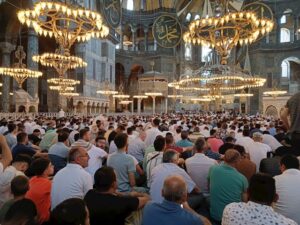
According to Islamic Scholars, you can also recite the following dua after Taraweeh prayers:
سُبْحَانَ ذِی الْمُلْکِ وَالْمَلَکُوْتِ سُبْحَانَ ذِی الْعِزَّةِ وَالْعَظَمَةِ وَالْهَيْبَةِ وَالْقُدْرَةِ وَالْکِبْرِيَآئِ وَالْجَبَرُوْتِ سُبْحَانَ الْمَلِکِ الْحَيِ الَّذِی لَا يَنَامُ وَلَا يَمُوْتُ سُبُّوحٌ قُدُّوْسٌ رَبُّنَا وَرَبُّ الْمَلَائِکَةِ وَالرُّوْحِ ط اَللّٰهُمَّ اَجِرْنَا مِنَ النَّارِ يَا مُجِيْرُ يَا مُجِيْرُ يَا مُجِيْر
Transliteration: Subhana zil mulki wal malakooti subhana zil izzati wal azamati wal haibati wal qudrati wal kibriyaai wal jabaroot. Subhanal malikil hayyil lazi laa yanamu wala yamootu subboohun qud’doosur-rab’buna wa rab’bul malaaikati war’rooh. Allahumma ajirna minan naar, ya mujeeru ya mujeeru ya mujeer
Translation: “Exalted is the Possessor of the hidden and the manifest dominion. Exalted is the Possessor of Might, Greatness, Reverence, Power, Pride and Majesty.Exalted is the Master, the Living, the one who neither sleeps nor dies. All-perfect, All-holy, Our Lord, and the Lord of the angels and the souls. O Allah, grant us refuge from the Hellfire. O Granter of refuge, O Granter of refuge, O Granter of refuge.”
Dua for Forgiveness
اللَّهُمَّ إِنِّي ظَلَمْتُ نَفْسِي ظُلْمًا كَثِيرًا، وَلاَ يَغْفِرُ الذُّنُوبَ إِلَّا أَنْتَ، فَاغْفِرْ لِي مَغْفِرَةً مِنْ عِنْدِكَ، وَارْحَمْنِي إِنَّكَ أَنْتَ الغَفُورُ الرَّحِيمُ
Transliteration: ‘Allahumma inni zalamtu nafsi zulman kathira wala yaghfirudh dhunuba illa anta faghfirli maghfiratam min ‘indika war hamni innaka antal ghafurur rahim.’
Translation: “O Allah! I have greatly wronged myself and none forgives sins except You, so grant me Your forgiveness and have mercy on me. You are the Forgiving, the Merciful.”
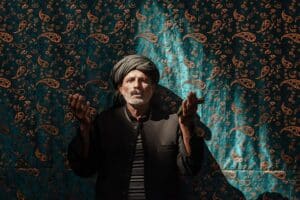
What Are the 3 Stages of Ramadan?
According to Islamic narrations, Allah SWT has divided the sacred month of Ramadan into three stages or Ashras, which means “ten days” in Arabic. The first stage of Ramadan is called Ashra-e-Rehmat.
The second stage of Ramadan is called Ashra-e-Maghfirat and the third stage is named Ashra-e-Nijat. Each one of these Ashras has a special dua that Prophet Muhammad (PBUH) has instructed the Muslims to recite as much as possible.
The Messenger (PBUH) of Allah SWT said: “It (Ramadan) is the month, whose beginning is mercy, its middle, forgiveness and its end, emancipation from the fire (of hell).” (Sahih Ibn Khuzaymah, Hadith No. 1887)
Prophet Muhammad (PBUH) stated, “And in this month, four things you should endeavour to perform in great number; two of which shall be to please your Lord, while the other two shall be those without which you cannot make do.
“Those which shall be to please your Lord, are that you should in great quantity recite the Kalimah Ṭayyibah: Lā ilāha illallāh, and make much ‘Istighfār’ (beg Allāh’s Forgiveness). And as for those without which you cannot make do, you should beg Allāh for entry into Jannah and seek refuge with Him from the fire of Jahannam.” (Sahih Ibn Khuzaymah)”
Stage 1 – Ashra-e-Rehmat (Mercy)
The first ten days of the Holy month of Ramadan (01 Ramadan to 10 Ramadan) are the days of blessings and Mercy. Therefore, Prophet Muhammad (PBUH) has advised every Muslim to seek the blessings and mercy of Allah SWT in the sacred Ashra of Rehmat.
Dua for the First Ashra
رَبِّ اغْفِرْ وَارْحَمْ وَأَنْتَ خَيْرُ الرَّاحِمِينَ
Transliteration: Rabbighfir warham wa anta khair-ur-raahimeen.
Translation:
O! My Lord forgive and have Mercy and You are the Best of Merciful.”
Stage 2 – Ashra-e-Maghfirat (Forgiveness)
The second stage of Ramadan includes the next ten days from 11 Ramadan till 20 Ramadan. It is called Ashra-e-Maghrifat. This Ashra is all about seeking forgiveness from Allah SWT and repenting for sins while keeping in mind that He (SWT) is the most merciful.
The Messenger (PBUH) of Allah SWT told his Ummah that Ashra-e-Maghfirat is a time when Allah Almighty is most forgiving and all you need to do is ask for His forgiveness.
Allah SWT in the Holy Quran says, “And hasten to forgiveness from your Lord, and a garden the extensiveness of which is the heavens and the earth, prepared for those who guard against evil.” (Holy Quran, 3:132)
“Will they not turn to Allah and seek his forgiveness? And Allah is oft-forgiving, merciful.” (Holy Quran, 5:74)
Dua for the Second Ashra
اَسْتَغْفِرُ اللہَ رَبِّی مِنْ کُلِّ ذَنْبٍ وَّ اَتُوْبُ اِلَیْہِ
Transliteration: Astagfirullaha Rab – Bi Min Kulli Zambi Wa Atoobu Ilayhi.
Translation: I seek forgiveness from Allah, my Lord, from every sin I committed.
Stage 3 – Ashra-e-Nijat (Seek Refuge)
The third stage of Ramadan, also known as Ashra-e-Nijat, spans the 21st till the 29th or 30th of the month. ‘Niyat’ is an Arabic word which means “protection from the Hell fire.” Being the most significant ten days of the Islamic calendar, it is believed that the “Night of Power” (Laylatul Qadr) resides within the third Ashra.
According to Islamic narrations, it was the night when Allah SWT revealed the Holy Quran to Prophet Muhammad (PBUH) through Angel Jibreel (AS). Therefore, to maximize their prayers, Muslims also practice Itikaf (seclusion) in Ashra-e-Nijat.
Allah SWT in the Holy Quran says,
“We sent it (Quran) down on a blessed Night. Verily, We are ever warning. Therein (in that Night) is decreed every matter of ordainment. Amran (i.e. a command or this Quran or His Decree of every matter) from Us. Verily, We are ever sending (the Messenger) (As) a Mercy from your Lord.”[Holy Quran 44: 3-6]
Dua for the Third Ashra
اَللَّهُمَّ أَجِرْنِي مِنَ النَّارِ
Transliteration: Allahuma Ajirni minan naar.
Translation: “O Allah, save me from the fire (Jahannam).”
Summary – Ramadan Duas
The sacred month of Ramadan provides one with an excellent opportunity to seek forgiveness from Allah SWT and make positive changes within oneself. During the ninth month of the Islamic calendar, Muslims worldwide aim to perform good deeds such as fasting, praying, giving charity (zakat) and helping others in order to attain the highest level of reward and blessings from the Almighty.
Reciting the aforementioned Ramadan duas will help one get closer to Allah SWT and help them live a righteous life and become better human beings.
Through His Names
New course with
Ustadh Shabbir Hassan




